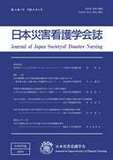Japanese
English
- 有料閲覧
- Abstract 文献概要
- 参考文献 Reference
- サイト内被引用 Cited by
要旨
【目的】A県の市町村保健センターにおける東日本大震災時の他地域住民への保健師活動の実態を明らかにする。
【方法】44か所の市町村保健センターに、自記式調査票の郵送法による調査を実施した。
【結果】有効回答数は38か所(86.3%)であった。他地域住民の避難を受け入れたのは、23か所(60.5%)であった。支援がうまくいったと回答した割合が高かったのは「健康管理」「環境整備」「物品補充」であり、低かったのは「住民の特性把握」「他地域と地元住民の関係性の構築」「他地域住民管轄市町村への連絡」であった。
【結論】他地域住民への支援において、管轄内の住民と同様に健康管理への支援が重要であり、短い関わりの中での不安への支援のあり方が課題である。多様な状況の中で要援護者を見落とさず支援をしていく必要があり、他地域住民を管轄していた市町村との連携や医療機関確保のための保健所との連携が課題である。大規模災害では他地域住民を受け入れることを想定し、東日本大震災での課題を明らかにし、その内容をマニュアル作成へ活かしていくことが重要である。
In this study, a survey of 44 local city health centers was conducted in A Prefecture to clarify the actual situation of public health nurse activities in relation to refugee residents from other areas after the Great East Japan Earthquake.
Data from 38 respondents were used for the analysis,which showed that 60 percent of local health centers accepted refugee residents from other areas. Support was found to have been successful in health care administration, environmental management and supplemental provision of everyday items, while poor results were observed in the areas of grasping residents' characteristics, formation of relationships between locals and refugee residents from other areas, and connections in other local-resident-jurisdiction cities, towns and villages.
In the provision of assistance to local residents, support for health care administration is important just as it is for residents from elsewhere. In this context, the situation of support against a background of unease caused by poor relationships is a subject for discussion. Other areas to be investigated are 1) collaboration with cities, towns and villages unable to provide the support people require and themselves needing support while having jurisdiction over other local residents in various situations, and 2) collaboration with health centers for medical institution reservations. For response to large-scale disasters, it is important to examine issues observed in the wake of the Great East Japan Earthquake and to harness the lessons learned to support manual preparations for accepting residents from other areas.
Copyright © 2014, Japan Society of Disaster Nursing All rights reserved.


